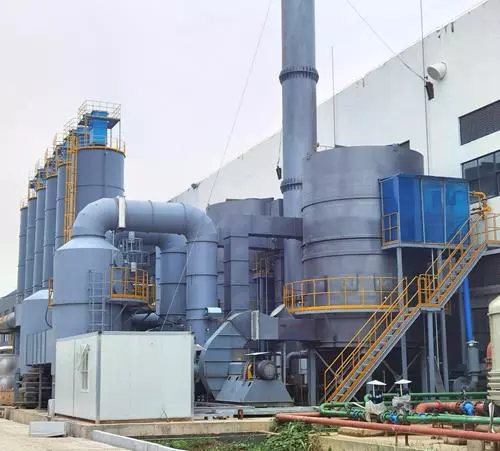What are the alternatives to an RTO thermal oxidizer?
การแนะนำ
Regenerative Thermal Oxidizers (RTOs) are widely used for controlling air pollution, specifically Volatile Organic Compounds (VOCs), from industrial processes. However, due to their high capital and operating costs, some industries may look for alternative solutions. In this article, we will discuss some of the alternatives to an ออกซิไดเซอร์ความร้อน RTO
.
Thermal Recuperative Oxidizers
Thermal Recuperative Oxidizers (TROs) are an alternative to RTOs for VOC abatement. TROs use a heat exchanger to recover heat from the oxidizer exhaust to preheat the incoming process stream, reducing the energy demand of the system. TROs also have lower capital costs compared to RTOs.
One of the disadvantages of TROs is that they can only handle low to medium VOC loadings. TROs also have a lower destruction efficiency compared to RTOs, especially for halogenated compounds.
Catalytic Oxidizers
Catalytic Oxidizers (COs) are another alternative to RTOs for VOC control. COs use a catalyst to promote the oxidation of VOCs at lower temperatures than thermal oxidizers, resulting in lower energy consumption.
COs have a higher destruction efficiency than TROs and can handle a wide range of VOC loadings. However, COs have higher maintenance costs due to the replacement of the catalyst and are sensitive to poisons and contaminants in the process stream.
Adsorption Systems
Adsorption systems are an alternative to thermal oxidizers that use activated carbon or other adsorbent materials to capture VOCs from the process stream. Adsorption systems can have lower capital costs compared to thermal oxidizers, especially for low to medium VOC loadings.
One of the drawbacks of adsorption systems is that they require periodic replacement or regeneration of the adsorbent material, resulting in higher operating costs. The adsorbent material can also become saturated, reducing its effectiveness in capturing VOCs.
Biofiltration Systems
Biofiltration systems are another alternative to thermal oxidizers for VOC control. Biofiltration systems use microorganisms to biodegrade the VOCs and convert them into carbon dioxide and water.
Biofiltration systems have lower energy consumption compared to thermal oxidizers and can handle a wide range of VOC loadings. However, biofiltration systems are sensitive to temperature, humidity, and pH levels, and can have higher capital costs due to the need for odor control and pre-treatment of the process stream.
บทสรุป
In conclusion, while RTOs are a widely used technology for VOC control, there are alternative solutions available. TROs, COs, adsorption systems, and biofiltration systems are just some of the alternatives to consider, depending on the specific process requirements and economic considerations. It is important to evaluate the advantages and disadvantages of each technology before making a decision.

เกี่ยวกับบริษัทของเรา
We are a high-tech equipment manufacturing enterprise specializing in comprehensive control of volatile organic compounds (VOCs) exhaust gas and carbon reduction and energy-saving technologies. Our core technologies include thermal energy, combustion, sealing, and self-control. We have capabilities in temperature field simulation, air flow field simulation modeling, ceramic heat storage material performance, zeolite molecular sieve adsorbent material selection, and VOCs high-temperature incineration and oxidation experimental testing.
Team Advantage
We have established RTO technology research and development center and waste gas carbon reduction engineering technology center in Xi’an, as well as a 30,000©O production base in Yangling. We are a leading manufacturer of RTO equipment and zeolite molecular sieve rotary wheel equipment globally. Our core technical team comes from the Sixth Academy of China Aerospace Liquid Rocket Engine Research Institute. We have more than 360 employees, including over 60 R&D technical backbones, 3 senior engineers with research associate titles, 6 senior engineers, and 40 thermodynamics PhDs.
Core Products
Our core products include the Rotary Valve Thermal Oxidizer (RTO) and the zeolite molecular sieve adsorption and concentration rotary wheel. With our expertise in environmental protection and thermal energy system engineering, we can provide customers with comprehensive solutions for industrial exhaust gas treatment, carbon reduction, and thermal energy utilization for various operating conditions.
Certifications, Patents, and Honors
- Intellectual Property Management System Certification
- Quality Management System Certification
- Environmental Management System Certification
- Construction Enterprise Qualification
- High-tech Enterprise
- Patent for Rotary Valve Thermal Oxidizer
- Patent for Rotary Wheel Thermal Incineration Equipment
- Patent for Disc Zeolite Rotary Wheel

Choosing the Right RTO Equipment
- Determine the characteristics of the exhaust gas
- Understand local regulations and emission standards
- Evaluate energy efficiency
- Consider operation and maintenance
- Budget and cost analysis
- Select the appropriate type of RTO
- Environmental and safety considerations
- Performance testing and validation

Our Service Process
- Consultation and assessment: Initial consultation, on-site inspection, needs analysis
- Design and solution development: Solution design, simulation modeling, solution review
- Production and manufacturing: Customized production, quality control, factory testing
- Installation and commissioning: On-site installation, commissioning, training services
- After-sales support: Regular maintenance, technical support, spare parts supply
We are a one-stop solution provider with a professional team dedicated to customizing RTO solutions for our clients.
